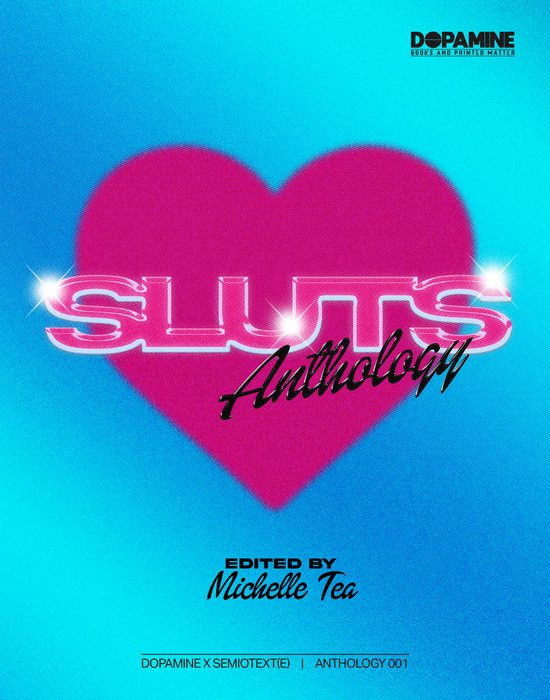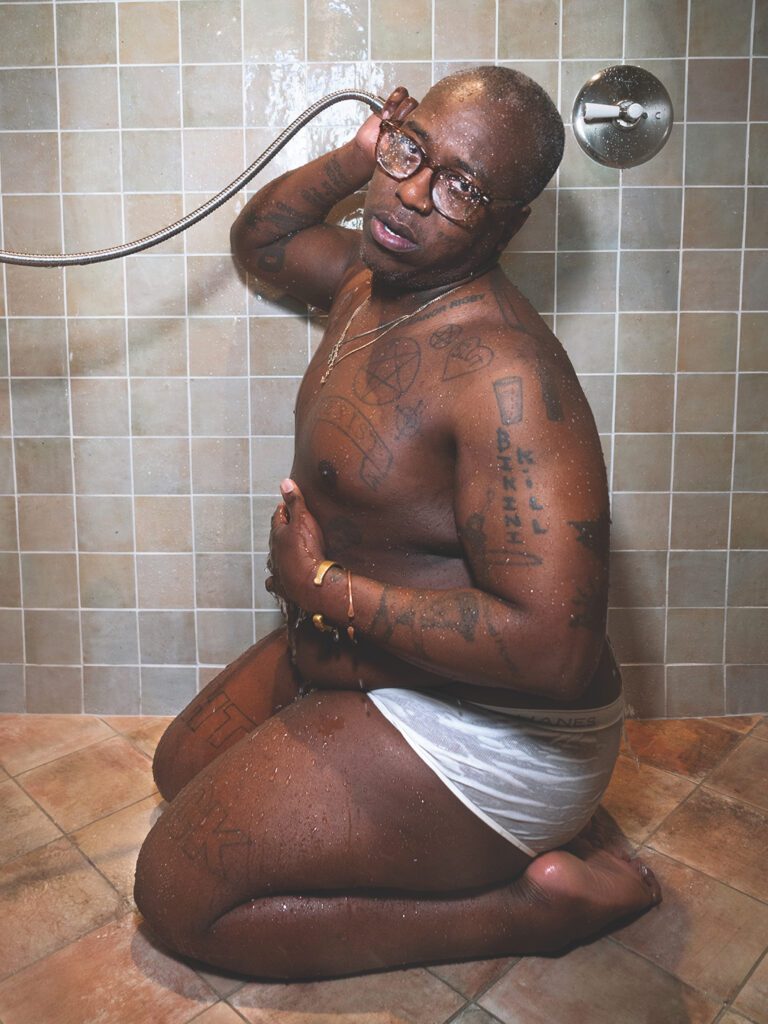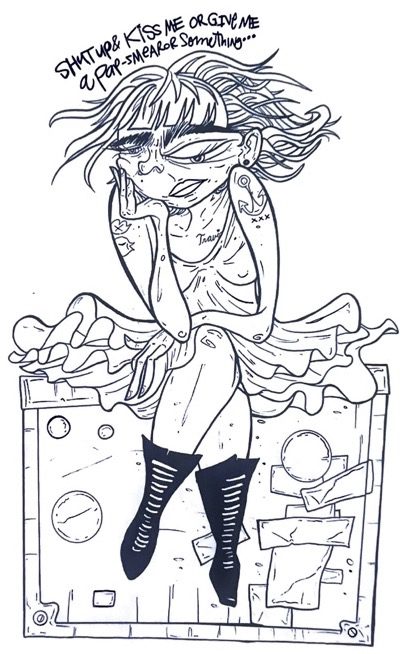
Convinced that the vast volume of murder podcasts I was listening to was making me both dumber and more paranoid, I recently made a major intellectual upgrade and tried out . . . murder audiobooks. The kind of terrible women’s psychological thrillers that usually feature secret pasts, betrayals, specious plots, spouses who are not who they seem to be, etc. So some miscellaneous Lisa Unger was the soundtrack to my dish washing and laundry folding at the time I began reading Michelle Tea’s fantastic new anthology SLUTS, and I can tell you, it made for a really weird counterpoint.
The women-written women of psychological thrillers are (surprisingly, if cringe-ily) in control of their own desire and frank about it. Liberally peppered sex scenes feature couples “tearing each other’s clothes off,” lots of “ENTERING,” and even a bit of light exhibitionism. The language can get pretty horny. The first-person narrators are conspicuously lacking in physical description, presumably so that readers can insert themselves in the steamy scenes and spine-tingling adventures. Sex posi! But I kept thinking—this isn’t slutty, and why isn’t it? Is it because even the extramarital sex is relationship-adjacent? The pleasure enjoyable but not really an end in and of itself, more an aspirational success signifier like the characters’ Teslas and luxury homes? Is it that the messy quest for feminine emotional fulfillment in these books always seems to resolve in the deus ex machina of having a child? It’s enthusiastically pursued sex, yes, but it feels defanged. Does that mean sluttiness is defined by illicitness? Danger? Defiance? Can you be a slut in a marriage? Do the anodyne comforts of capitalist achievement dissolve the sweet floss of sluttery like so much cotton candy dunked in a Sprite?
SLUTS has the answers! A chorus of them, really. And a lot more questions. The much anticipated first release on Michelle Tea’s queer outlaw press Dopamine, SLUTS tackles its theme with an all-singing-all-dancing approach to curation that welcomes range and contradiction as essential in limning something so faceted and subjective. The book flits comfortably from fiction to personal essay to play to memoir to sci-fi to poetry to I shit you not a delightful rebus. Only someone who has spent their literary career being the unusual combination of really smart and really generous could assemble this credible roster of heavy hitters. Hedi El Kholti’s recollections of early lovers and the atmospheric confusion of a nineties being/coming out; Zoe Whittall’s realist and darkly hilarious tale of a lazy stripper featuring all-you-can-eat shrimp buffets and fake Scottish accents; Nate Lippens’s sharply observed and observant street hustlers; Chloe Caldwell’s pithy and hot snapshot of post-divorce sex, blurry in the way that times of huge transformation are; every single thing Gary Indiana wrote.

Brontez Purnell’s witty ramble on sex as self-definition, white guys on Grindr with #BLM in their bios, and being “the sexiest boy in San Francisco in 2006” made me antsy when it ended—like he’d jumped up mid-sentence to get champagne from the fridge and I was dying for him to come back and tell me more. Robert Gluck’s two-page wallop of a story about a first sexual experience was so squirmingly funny I screamed out loud at the end.
With the best anthologies, you discover writers who are new to you and you have the joy of hopping online and buying all their books. Those standouts in SLUTS include Laurie Stone and her meditative piece about a fleeting encounter on a train. Three scant pages bristling with epigrams you’ll turn over in your mind, underline to revisit: “The pleasure of a stranger is the pleasure of nature. It’s beyond our capacity to know it, because we are outsiders.”
Or Jeremy Atherton Lin and his sublime essay on suburban fetish, the grey area between wanting to be something and wanting to fuck something, and participating aspirationally in amateur dial-up porn. The weird alchemy where you find a way to exist via objective obliteration. Is a slut a person who owns their objectification? He writes, “I cropped out half my big forehead . . . and half my brain . . . A fantasy was built by what was cropped out of the image . . . Exhibitionism was a way to disappear.”
Not everything works—there are uneven pieces that could have been cut and some that might have benefited from a heavy edit. But even the least resonant were engaging when considered in conversation with other pieces. There, a tension emerges, particularly around questions of how shame and risk operate in desire. Gary Indiana’s genius piece explores getting fucked in sex vs. fucked in life—wanting to be the bottom, be the bitch, receive the enormous unmanageable dick, is not a metaphor for wanting to be fucked in the waking world. While prizing “the carnal frenzy produced by repression . . . in the ’50s and ’60s,” and lamenting that “being gay was really an unusual thing when I was growing up, you met interesting people, and lived in the seedy margins of sex with all the excitement that brought with it . . . the effulgence of gay culture has made this a club that virtually anybody can get into, and so it’s lost its edginess,” Indiana is clear this isn’t a corollary for his life. “I want this guy’s boyishness and the feelings he has immediately before, during, and after the sexual connection, but not most of what goes on outside that connection. I don’t want his masculinity except in the form of his hard dick. I want his macho expectations of life to be disappointed and I want my ass to be his consolation prize.”
Purnell echoes a similar sentiment around queernesses past, “before we had won the visibility war and created hierarchical realities where we could self-segregate and abuse each other.” Now he is left to understand “how access, seemingly endless options, and visibility has warped our orbits.” After an interaction with an almost administratively organized “Leather Family” that purports to want to teach him how to be in a “healthy and committed S&M relationship,” Tom Cole wonders how this is ultimately any more interesting than a typical nuclear family. These pieces relish the perversion of an outsider identity, the victory of taking pleasure in it.
Conversely, Carley Moore’s “My Big Slutty Essay” asks, “What if we were allowed to be our fully sexual selves without shame, punishment, fear of pregnancy and disease, and/or surveillance?” She finds slut-shaming and trauma lurking in the landscape, from her mother catching her masturbating, to sensing vague rumors about her among her study abroad group, to friends who post online that Janelle Monáe is trying too hard. These were negatively formative events to be overcome through therapy, and Moore’s utopic vision is for these experiences to be completely eliminated so everyone can enjoy “fucking, pleasure, love, sex, bodies, orgasms, desire, flirting, make-outs, kink, BDSM, romance, masturbation, sex toys, monogamy, polyamory, fantasy, porn, sex work.”

I mean, sure? I have to admit here, the moniker slut no longer holds immediate magnetism for me personally, but that list of proclivities rendered with such . . . stakelessness had all the frisson and eroticism of those weird 1960s Kim Casali Love Is cartoons with the naked toddler/adult couple. Genital-less, with lobotomized grins and half-closed eyes, holding hands in a field of flowers or performing the rituals of marriage. What would constitute our fantasy lives in a world completely without friction, without danger, no dark corners of the mind to plumb, just a long sunny hallway of wellness? Would sex become a purely athletic act? Without sleaze, will we have to trade John Waters for like, JoJo Siwa?
What does slut mean is one question but what do we want from it is another. Is rehabbing slut intended to evacuate sex of shame? Can you reclaim slut without sanitizing it?
Amanda Montell’s treatise on the etymology of slut approaches where this reclamation process may have landed. She notes that slut first makes its appearance around the 1400s, meaning a lazy or “untidy person,” later gaining a gender slant courtesy of Shakespeare to imply a “loose woman.” Montell jumps ahead to the late-1990s, where she makes the notable omission of riot grrrl and credits academics and the book The Ethical Slut for beginning to turn the word around. Kathleen Hanna’s iconic 1992 photo with slut scrawled across her stomach, and legions of teen fans doing the same at shows, were heavily covered in mainstream press—emblematic of a national zine and music focused movement of young third-wave feminists wrestling with the language and institutions used to define them. Having skipped that beat, Montell does mention SlutWalk participants writing slut on themselves twenty years later.
We jump again to 2022, when a teen actor tweets, with no context, simply “slut era,” and the word catches fire for a new generation. (A generation, incidentally, that the press breathlessly announces is having far less sex than its predecessors. Archives of Sexual Behavior notes that 15 percent of Gen Zers ages 20–24 report having no sex since age 18, versus only 6 percent of Gen Xers at the same age. A 2021 UCLA study found that 38 percent of 18–30 year olds had no sex the prior year, up from 22 percent in 2011.) With the lightning speed of social media’s hive-mind wit, “slut era” is immediately meme-ified, and within six months its usage in tweets evolves from denoting hedonism to the ironic opposite: “In my slut era (eating 3 meals a day, only crying once a week, remembering to take my SSRIs)”; “‘slut era’ i say as i rot and decay in my bedroom and watch the years pass me by.” Montell cites a Rolling Stone piece on the new “slut era”: “We declare ourselves sluts in a flatly ironic way . . . in the same breath admitting we can’t (or won’t) be putting in the work, which is too tiring and tedious.”
Who could blame Gen Z? In the face of rising fascism, a trashed economy, and impending climate change, is a decadent exhaustion the new sluttery? How will modern scrutiny of language and fetish for interpersonal safety metabolize the reality of existential threats? I’m brought back to Bush-in-Iraq-era 2003, watching my friend Jerry grinding on stage naked except for hot pink hot pants with the words “SHOCK” and “AWE” emblazoned across the cheeks. I’m hopeful we’ll find our way back to fun?
SLUTS is a big, loud, and fascinating conversation you’re having with yourself and your 350 pages of new friends. You’ll come away with a whole slew of exciting ideas you can wrangle with while folding your laundry, instead of listening to Crime Junkie or Unreliable Narrator Murder on the Infidelity Express. Michelle Tea helming a press is truly a no-brainer and I can’t wait for Dopamine’s next release.
Title taken from the essay “The Tyranny of Structurelessness” by Tom Cole.

